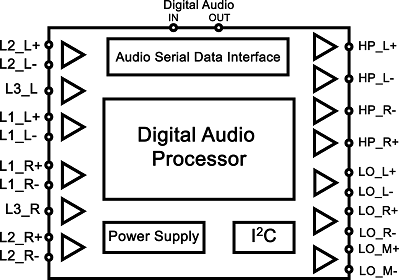SLAS663C August 2009 – June 2016 TLV320AIC3106-Q1
PRODUCTION DATA.
- 1 Features
- 2 Applications
- 3 Description
- 4 Revision History
- 5 Description (Continued)
- 6 Device Comparison Table
- 7 Pin Configuration and Functions
-
8 Specifications
- 8.1 Absolute Maximum Ratings
- 8.2 ESD Ratings
- 8.3 Recommended Operating Conditions
- 8.4 Thermal Information
- 8.5 Electrical Characteristics
- 8.6 Switching Characteristics I2S/LJF/RJF In Master Mode
- 8.7 Switching Characteristics I2S/LJF/RJF In Slave Mode
- 8.8 Switching Characteristics DSP In Master Mode
- 8.9 Switching Characteristics DSP In Slave Mode
- 8.10 Typical Characteristics
-
9 Detailed Description
- 9.1 Overview
- 9.2 Functional Block Diagram
- 9.3
Feature Description
- 9.3.1 Audio Data Converters
- 9.3.2 Stereo Audio ADC
- 9.3.3 Automatic Gain Control (AGC)
- 9.3.4 Stereo Audio DAC
- 9.3.5 Digital Audio Processing For Playback
- 9.3.6 Digital Interpolation Filter
- 9.3.7 Delta-Sigma Audio Dac
- 9.3.8 Audio Dac Digital Volume Control
- 9.3.9 Analog Output Common-Mode Adjustment
- 9.3.10 Audio DAC Power Control
- 9.3.11 Audio Analog Inputs
- 9.3.12 Analog Input Bypass Path Functionality
- 9.3.13 ADC PGA Signal Bypass Path Functionality
- 9.3.14 Input Impedance and VCM Control
- 9.3.15 MICBIAS Generation
- 9.3.16 Analog Fully Differential Line Output Drivers
- 9.3.17 Analog High Power Output Drivers
- 9.3.18 Short Circuit Output Protection
- 9.3.19 Jack and Headset Detection
- 9.3.20 General-Purpose I/O
- 9.4 Device Functional Modes
- 9.5
Programming
- 9.5.1 Hardware Reset
- 9.5.2 Digital Control Serial Interface
- 9.5.3 I2C Control Mode
- 9.5.4 I2C Bus Debug In A Glitched System
- 9.5.5 Digital Audio Data Serial Interface
- 9.5.6 Right-Justified Mode
- 9.5.7 Left-Justified Mode
- 9.5.8 I2S Mode
- 9.5.9 DSP Mode
- 9.5.10 TDM Data Transfer
- 9.5.11 Audio Clock Generation
- 9.6 Register Maps
- 10Application and Implementation
- 11Power Supply Recommendations
- 12Layout
- 13Device and Documentation Support
- 14Mechanical, Packaging, And Orderable Information
Package Options
Mechanical Data (Package|Pins)
- RGZ|48
Thermal pad, mechanical data (Package|Pins)
- RGZ|48
Orderable Information
1 Features
- Qualified for Automotive Applications
- AEC-Q100 Qualified With the Following Results:
- Device Temperature Grade 3: –40°C to 85°C Ambient Operating Temperature Range
- Device HBM ESD Classification Level 1C
- Device CDM ESD Classification Level C6
- Stereo Audio DAC
- 102-dBA Signal-to-Noise Ratio
- 16-, 20-, 24-, or 32-Bit Data
- Supports Rates From 8 kHz to 96 kHz
- 3D, Bass, Treble, EQ, De-Emphasis Effects
- Flexible Power Saving Modes and Performance are Available
- Stereo Audio ADC
- 92-dBA Signal-to-Noise Ratio
- Supports Rates From 8 kHz to 96 kHz
- Digital Signal Processing and Noise Filtering Available During Record
- Ten Audio Input Pins
- Programmable in Single-Ended or Fully Differential Configurations
- 3-State Capability for Floating Input Configurations
- Seven Audio Output Drivers
- Stereo Fully Differential or Single-Ended Headphone Drivers
- Fully Differential Stereo Line Outputs
- Fully Differential Mono Output
- Low Power: 15-mW Stereo 48-kHz Playback With 3.3-V Analog Supply
- Ultralow-Power Mode with Passive Analog Bypass
- Programmable I/O Analog Gains
- Programmable PLL for Flexible Clock Generation
- Control Bus Selectable SPI or I2C
- Audio Serial Data Bus Supports I2S, Left/Right-Justified, DSP, and TDM Modes
- Power Supplies:
- Analog: 2.7 V to 3.6 V
- Digital Core: 1.65 V to 1.95 V
- Digital I/O: 1.1 V to 3.6 V
2 Applications
- Cluster
- Head Unit
- Car Audio
- Emergency Call (eCall)
- Telematics Control Unit
3 Description
The TLV320AIC3106-Q1 is a low-power stereo audio codec with stereo headphone amplifier, as well as multiple inputs and outputs programmable in single-ended or fully differential configurations. Extensive register-based power control is included, enabling stereo 48-kHz DAC playback as low as 15 mW from a 3.3-V analog supply, making it ideal for car audio applications in cluster and head unit systems.
The record path of the TLV320AIC3106-Q1 contains integrated microphone bias, digitally controlled stereo microphone preamplifier, and automatic gain control (AGC), with mix and mux capability among the multiple analog inputs. Programmable filters are available during record which can remove audible noise that can occur in unpredictable environments, such as when an eCall system is activated. The playback path includes mix and mux capability from the stereo DAC and selected inputs, through programmable volume controls, to the various outputs.
Device Information(1)
| PART NUMBER | PACKAGE | BODY SIZE (NOM) |
|---|---|---|
| TLV320AIC3106-Q1 | VQFN (48) | 7.00 mm × 7.00 mm |
- For all available packages, see the orderable addendum at the end of the data sheet.
Simplified Diagram

4 Revision History
Changes from B Revision (October 2012) to C Revision
- Added Applications section, Device Information table, Device Comparison Table, Table of Contents, Pin Configuration and Functions section, Specifications section, ESD Ratings table, Timing Requirements table, Switching Characteristics table, Timing and Switching Diagrams, Detailed Description section, Application and Implementation section, Power Supply Recommendations section, Layout section, Device and Documentation Support section, and Mechanical, Packaging, and Orderable Information sectionGo
- Deleted Ordering Information Table; see POA at the end of the datasheetGo
- Changed R to R/W for Bit D0 for Page 0, Registers 79, 86, and 93Go
Changes from A Revision (January 2010) to B Revision
- Changed TA in Electrical Characteristics condition from 25°C to –40°C to 85°C.Go
- Added 25°C to the THD Test Conditions in Electrical Characteristics table.Go
- Added 25°C to the DAC DIGITAL INTERPOLATION title in Electrical Characteristics table.Go
- Added 25°C to the DIGITAL I/O title in Electrical Characteristics table.Go